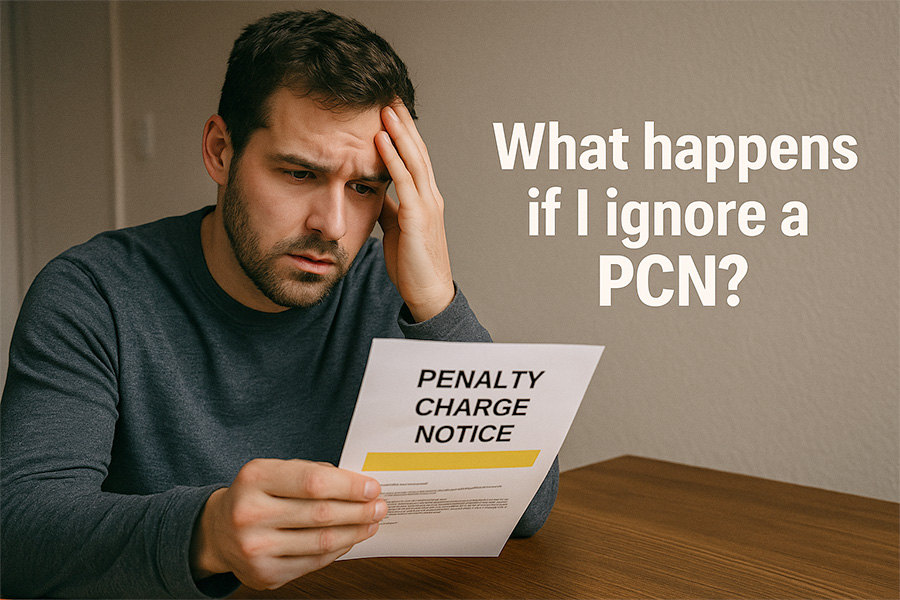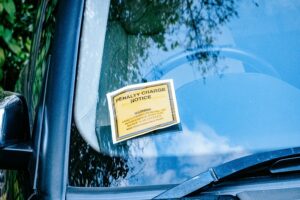What happens if I ignore a PCN?

Have you ever tossed a PCN into a drawer, hoping it might magically disappear? Every day, thousands of people gamble with penalty charge notices, wondering if ignoring them is a viable strategy. The harsh reality? That small piece of paper can snowball into court appearances, bailiffs at your door, and financial damage lasting years. Whether it’s a parking fine or speeding ticket, the consequences of avoidance can be devastating. Before deciding how to handle your fine, consulting with a legal professional could be the difference between a minor inconvenience and a life-altering financial nightmare.

Key Takeaway: Is ignoring a PCN worth the risk?
Discover how a simple parking ticket can spiral into a years-long financial nightmare.
The escalation process of ignoring a PCN
The path from an unpaid PCN to severe legal consequences follows a precise and unforgiving timeline. Understanding how a penalty charge notice escalates can help you grasp the urgency of addressing it promptly:
- Day 1-14: Initial discount period (50% off) – opportunity missed.
- Day 15-28: Full payment period expires – penalty now at 100%.
- Day 29-56: Charge Certificate issued – penalty increases by another 50%.
- Day 57-65: Registration with Traffic Enforcement Centre at County Court – £8 registration fee added.
- Day 66-80: Order for Recovery and Witness Statement sent – last chance before enforcement.
- Day 81+: Warrant issued to enforcement agents – additional fees of £75 (compliance), £235 (enforcement), and £110 (sale) may apply.
What starts as a £70 parking penalty charge notice can quickly transform into a £458+ debt once enforcement begins. The letters escalate from polite reminders to formal legal demands, with each document carrying increasingly serious implications for your financial future.
Legal consequences of unpaid PCNs
The legal machinery that activates when you ignore a PCN is designed to ensure payment through increasingly serious measures. Once your penalty charge notice passes through the administrative stages, it enters the judicial system:
- County Court registration: Your debt is registered at the Traffic Enforcement Centre at Northampton County Court, creating a legal record of your non-payment.
- Appeal rights diminished: Your right to contest the original penalty charge notice severely narrows. Your penalty charge notice appeal letter options become limited to just four statutory grounds.
- Bailiff appointment: The court authorises enforcement agents with legal powers to visit your home, demand payment, and potentially seize goods.
- County Court judgment (CCJ): A formal judgment is registered against you, remaining on your credit file for six years.
- Additional enforcement options: Courts can authorise attachment of earnings (taking money directly from your wages), freezing bank accounts, or charging orders against your property.
Enforcement methods: When bailiffs come knocking
When your unpaid PCN reaches enforcement stage, bailiffs become the frontline collectors of your debt. These enforcement agents operate with significant legal authority:
- Initial contact: Bailiffs must provide 7 days’ notice before their first visit, typically through a “Notice of Enforcement” letter.
- Home visits: They can legally visit between 6am and 9pm, and may return multiple times until the debt is resolved.
- Entry rights: They cannot force entry on first visit unless you have “vulnerable goods” outside (like vehicles), but can enter through unlocked doors or if previously invited in.
- Goods seizure: Bailiffs can take control of belongings equal to the debt value plus their fees, including:
- Electronics and luxury items
- Furniture (except basic necessities)
- Vehicles (unless essential for work or disability)
- Vehicle clamping: For unpaid parking penalty charge notices, they can clamp, immobilise, or remove your vehicle without entering your property.
- Controlled goods agreement: You may be offered an agreement to pay in instalments, with seized goods left in your possession temporarily.
The escalation from a simple penalty charge notice to having strangers inventorying your possessions happens often just months after the initial fine.
How to avoid severe penalties
Sidestepping the harsh consequences of an unpaid PCN requires decisive action. Here’s how to protect yourself:
- Respond within 14 days: Secure the 50% discount by paying promptly; this is the single most effective way to minimise financial impact.
- Never ignore correspondence: Even if disputing the penalty charge notice, acknowledge receipt of all communications.
- Use online payment systems: Most authorities offer 24/7 digital payment options that provide instant confirmation.
- Request hardship arrangements: Contact the issuing authority before deadlines expire to negotiate instalment terms.
- Appeal only with evidence: Submit a penalty charge notice appeal letter only with solid proof. Without it, you’re better off paying and preserving the discount.
- Get professional help early: For multiple PCNs or complex situations, seeking advice before escalation saves money in the long run.
Do I need a solicitor for my PCN case?
Most PCN matters don’t require legal representation, but certain situations justify professional help:
- Multiple advanced PCNs: If you’re facing several penalty charge notices already at bailiff stage, a solicitor can negotiate bulk settlements.
- Vulnerability issues: If you have mental health challenges or disabilities that affected your ability to respond, legal help can present these mitigating factors effectively.
- Procedural errors: Solicitors can quickly identify if the authority failed to follow proper protocols when issuing your penalty charge notice.
- Bailiff disputes: When enforcement agents overstep their legal boundaries, lawyers can halt improper actions immediately.
A solicitor specialising in traffic and parking matters typically charges £150-300 for PCN interventions; seemingly expensive until compared with the £400+ in bailiff fees alone for an ignored fine.
FAQs
- What does PCN stand for? PCN stands for Penalty Charge Notice. It’s an official document issued for traffic, parking, and other similar violations in the UK.
- Will an unpaid PCN affect my driving license? While a standard parking penalty charge notice won’t, certain traffic PCNs (like bus lane infractions or red-light violations) may carry penalty points if escalated to court proceedings.
- How long do authorities have to pursue an unpaid PCN? Authorities typically have six years to pursue payment of an unpaid penalty charge notice through civil action.
Ignoring a PCN is a costly gamble that rarely pays off. What begins as a simple penalty charge notice can quickly escalate into bailiff visits, court judgments, and years of credit damage. Addressing fines promptly, whether through payment or legitimate appeal, is always the most economical and stress-free approach.
Facing the consequences of an ignored PCN?
Qredible’s network of solicitors can assess your case, negotiate with authorities, and potentially save you hundreds in escalated fees.
KEY TAKEAWAYS
- Ignoring a penalty charge notice triggers an escalation process that can increase the original fine by over 500% through late fees, court costs, and bailiff charges.
- Legal consequences include county court judgments that remain on your credit file for six years, affecting your ability to obtain loans, mortgages, and even rental agreements.
- Enforcement agents have significant legal powers to visit your property, seize goods, and potentially clamp or remove vehicles for unpaid PCN debts.
- Responding within the first 14 days secures a 50% discount, making immediate action the most cost-effective approach to handling any fine.
Articles Sources
- patrol-uk.info - https://www.patrol-uk.info/what-happens-if-i-ignore-my-pcn/
- citizensadvice.org.uk - https://www.citizensadvice.org.uk/law-and-courts/parking-tickets/stop-being-chased-for-a-parking-ticket/
- haringey.gov.uk - https://www.haringey.gov.uk/parking/pcns-parking-traffic/if-you-do-not-pay
- thedebtadviceservice.co.uk - https://thedebtadviceservice.co.uk/pay-parking-charge-notice/
Do you need a solicitor?
Find a solicitor on Qredible in just a few easy steps
















